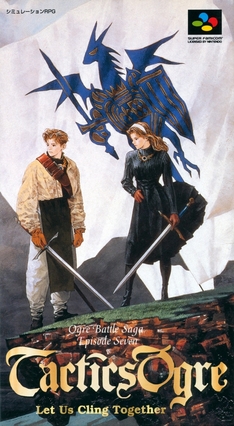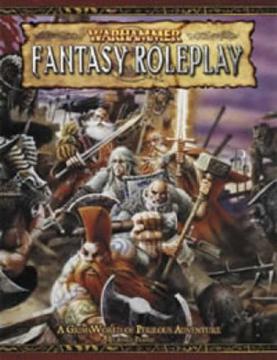
The Generic Universal RolePlaying System, or GURPS, is a tabletop role-playing game system designed to allow for play in any game setting. It was created by Steve Jackson Games and first published in 1986 at a time when most such systems were story- or genre-specific.

A role-playing game is a game in which players assume the roles of characters in a fictional setting. Players take responsibility for acting out these roles within a narrative, either through literal acting or through a process of structured decision-making regarding character development. Actions taken within many games succeed or fail according to a formal system of rules and guidelines.

In fantasy fiction, a lich is a type of undead creature.

A role-playing video game, commonly referred to as a role-playing game (RPG) or computer role-playing game (CRPG), is a video game genre where the player controls the actions of a character immersed in some well-defined world, usually involving some form of character development by way of recording statistics. Many role-playing video games have origins in tabletop role-playing games and use much of the same terminology, settings, and game mechanics. Other major similarities with pen-and-paper games include developed story-telling and narrative elements, player character development, complexity, as well as replay value and immersion. The electronic medium removes the necessity for a gamemaster and increases combat resolution speed. RPGs have evolved from simple text-based console-window games into visually rich 3D experiences.

Tactics Ogre: Let Us Cling Together is a 1995 tactical role-playing game developed and published by Quest Corporation for the Super Famicom. It was later ported to the Sega Saturn (1996) and the PlayStation (1997), the latter released in North America in 1998 by Atlus USA. The second entry in the Ogre Battle series, the story takes place in the war-torn kingdom of Valeria, where protagonist Denim Powell works in a local resistance force against occupying powers, ending up caught in the ethnic conflicts driving the war. Battles are turn-based, taking place on grid-based maps from an overhead perspective with a focus on positioning and using character class abilities.
Tactical role-playing games, also known as strategy role-playing games and in Japan as simulation RPGs, are a video game genre that combines core elements of role-playing video games with those of tactical strategy video games. The formats of tactical RPGs are much like traditional tabletop role-playing games and strategy games in appearance, pacing, and rule structure. Likewise, early tabletop role-playing games are descended from skirmish wargames such as Chainmail, which were primarily concerned with combat.
Al-Qadim is a campaign setting for the Dungeons & Dragons role-playing game which was developed by Jeff Grubb with Andria Hayday for TSR, Inc., and was first released in 1992. Al-Qadim uses One Thousand and One Nights as a theme and is set in the land of Zakhara, called the Land of Fate. Thematically, the land of Zakhara is a blend of the historical Muslim Caliphates, the stories of legend, and a wealth of Hollywood cinematic history. Zakhara is a peninsula on the continent of Faerûn in the world of Toril, the locale of the Forgotten Realms campaign setting, although Al-Qadim is designed to stand on its own or be added to any existing campaign setting. The basic campaign setting was divided between two game products: Al-Qadim: Arabian Adventures, a sourcebook describing character creation rules, equipment, and spells unique to the setting, and Al-Qadim: Land of Fate, a boxed set describing the land of Zakhara, with separate sourcebooks for the players and the Dungeon Master.

The Temple of Elemental Evil is a 2003 role-playing video game by Troika Games. It is a remake of the classic Dungeons & Dragons adventure The Temple of Elemental Evil using the 3.5 edition rules. This is the only computer role-playing game to take place in the Greyhawk campaign setting, and the first video game to implement the 3.5 edition rule set. The game was published by Atari, who then held the interactive rights of the Dungeons & Dragons franchise.

Return to Krondor is a role-playing video game set in Raymond Feist's fictional fantasy setting of Midkemia. A sequel to 1993's Betrayal at Krondor, it was released for Windows on the PC in time for the 1998 Thanksgiving and Christmas season. Within the game, the player commands a group of heroes with different attributes, strengths, and weaknesses which the player may upgrade over the course of the game.

Role-playing games (RPGs) have developed specialized terminology. This includes both terminology used within RPGs to describe in-game concepts and terminology used to describe RPGs. Role-playing games also have specialized slang and jargon associated with them.

Kenneth Hite is a writer and role-playing game designer. Hite is the author of Trail of Cthulhu and Night's Black Agents role-playing games, and lead designer of the 5th edition of Vampire: the Masquerade.

Dragon Warriors is a fantasy role playing game (RPG) system written by Dave Morris and Oliver Johnson and published by Corgi Books in 1985 and 1986. In 2009, it was re-collected in a new hardcover edition by Mongoose Publishing. This print run included the publication of several supplements to the Dragon Warrior's world "Legend". However, as of September 2010, this publication run had been discontinued but the books continue to remain available in PDF format.

The following is a timeline of tabletop role-playing games. For computer role-playing games see here.

Warhammer Fantasy Roleplay or Warhammer Fantasy Role-Play is a role-playing game set in the Warhammer Fantasy setting, published by Games Workshop or its licensees.

A tabletop role-playing game, also known as a pen-and-paper role-playing game, is a classification for a role-playing game (RPG) in which the participants describe their characters' actions through speech. Participants determine the actions of their characters based on their characterization, and the actions succeed or fail according to a set formal system of rules and guidelines. Within the rules, players have the freedom to improvise; their choices shape the direction and outcome of the game.

F.A.T.A.L., an acronym of Fantasy Adventure to Adult Lechery or From Another Time Another Land, is a dark fantasy tabletop role-playing game first published in 2002 by Fatal Games.

Prince Valiant: The Story-Telling Game is a licensed role-playing game published by Chaosium in 1989 that is based on Hal Foster's comic strip of the same name.
An adventure game is a video game genre in which the player assumes the role of a protagonist in an interactive story, driven by exploration and/or puzzle-solving. The genre's focus on story allows it to draw heavily from other narrative-based media, such as literature and film, encompassing a wide variety of genres. Most adventure games are designed for a single player, since the emphasis on story and character makes multiplayer design difficult. Colossal Cave Adventure is identified by Rick Adams as the first such adventure game, first released in 1976, while other notable adventure game series include Zork, King's Quest, Monkey Island, Syberia, and Myst.
While the early history and distinctive traits of role-playing video games (RPGs) in East Asia have come from Japan, many video games have also arisen in China, developed in South Korea, and Taiwan.

Ironclaw is a series of tabletop role-playing games created by Jason Holmgren of Sanguine Games, and features anthropomorphic characters in a setting inspired by class and religious conflicts during the Italian Renaissance. Jadeclaw is a related game in a concurrent East Asian setting.















